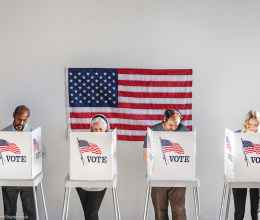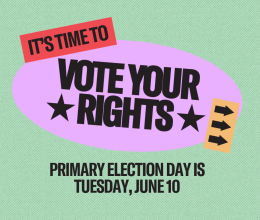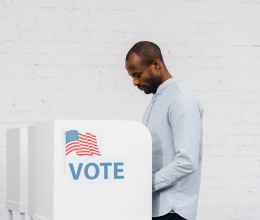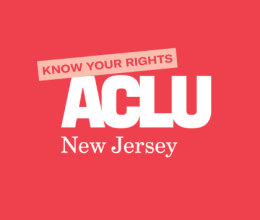
By Portia Allen-Kyle, Criminal Justice Transparency Fellow, ACLU of New Jersey
It’s election season in New Jersey. With so many candidates from both parties vying for a place on the ballot for the June 6 gubernatorial primary, each vote matters more than ever.
New Jersey’s laws on felony disenfranchisement raise the stakes in elections because they deprive people with criminal convictions of their right to vote if they’re incarcerated or under state supervision.
It’s time for New Jersey to change. It’s time for the Legislature to end felony disenfranchisement.
A criminal conviction should not take away the fundamental right to vote – especially when our prisons and jails bear the stain of extreme racial disparities. At a time when people fear our elections are falling short of what a democracy requires, the need for change is urgent.
In New Jersey, between 70,000 and 90,000 individuals with felony convictions cannot vote. That’s more than any other state in the Northeast. This number includes both individuals who are incarcerated and those who are out on probation or parole. People with these convictions do not lose their right to vote for a lifetime under the law; they can re-register to vote after completing their sentences.
But, because many people never re-register, losing the right to vote for any length of time imposes extra barriers that can thwart participation in the democratic process.
People are often struggling to reclaim their lives after their sentences end. Once New Jerseyans finish their sentences, or their terms of probation or parole end, re-registering to vote is rarely their chief concern. As a result, once you’re stricken from the rolls, registering to vote easily falls by the wayside indefinitely.
According to the New Jersey Division of Elections, 39,527 people were removed from the voter rolls between 2010 and 2016 because of criminal convictions. That’s an average of 1,882 voters lost per county. But, because of the over-policing of people of color, some counties are losing more voters than others.
This isn’t just about presidential or even gubernatorial elections. It’s also about the difference every vote makes where it matters most: in local elections. For example, in recent elections that were decided by a few hundred or even a couple dozen votes, these disenfranchised people could have made a difference.
The current laws in New Jersey are more repressive than many other states. In Maine and Vermont, people with felony convictions never lose the right to vote. Another 13 states – including Illinois, Massachusetts, Ohio, and Pennsylvania – revoke prisoners’ right to vote but do not disenfranchise people on probation or parole. New York allows probationers to vote, but not those in prison or on parole.
The New Jersey Legislature needs to stand up for democratic principles by ending felony disenfranchisement. And we need our officials to act as soon as possible.
The integrity of our democracy depends on the wide participation of all members. A criminal conviction should not disqualify anyone from engaging in the process of electing our leaders. No matter the criminal offense, all should be able to have their voices heard on the most important issues in our communities, from transparency at the highest levels of government to zoning board decisions down the street.
New Jersey must reform its laws, not simply to extend the right to vote to people on probation and parole, but to never take away a person’s right to vote in the first place.
| Party | Voters Disqualified | Percent |
|---|---|---|
| Conservative | 11 | 0.11 |
|
US Constitution |
9 | 0.09 |
|
Democratic |
7,751 | 79.6 |
|
Green |
14 | 0.14 |
|
Libertarian |
20 | 0.21 |
|
Natural Law |
7 | 0.07 |
|
Republican |
1,922 | 19.74 |
|
Socialist Party |
4 | 0.04 |
|
Total |
9,738 | 100 |
Source: New Jersey Department of State, Division of Elections






